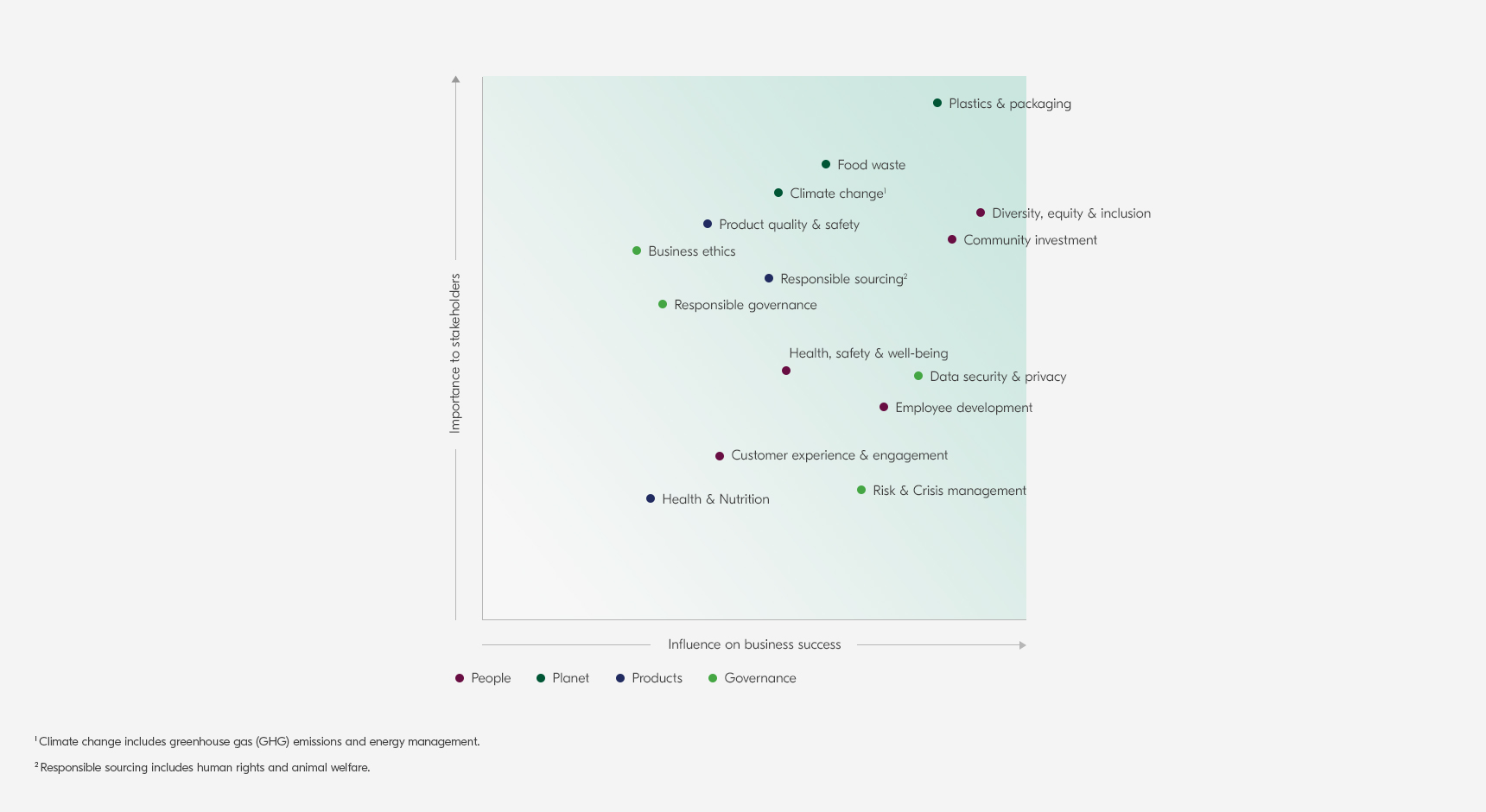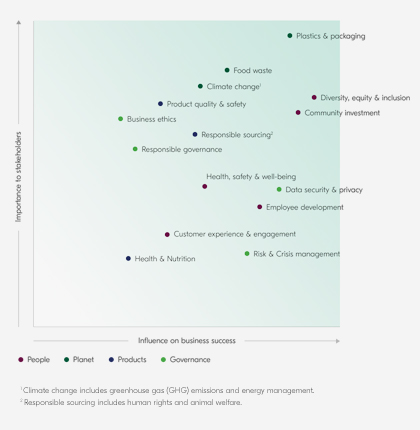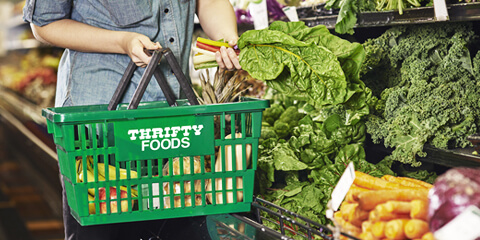On this page
Focusing on What Matters Most
To be a sustainable business and live our values, we can’t just act on the issues that we think are important. It’s critical that we listen and understand the topics that are front of mind for our stakeholders.
That’s why in fiscal year 2021 we initiated a materiality assessment to identify and prioritize the environmental, social and governance (ESG) issues most important to our stakeholders and that will influence our business success in the long-term. We started by identifying a list of 18 topics through the lens of customers, supplier partners, investors and company leaders as key stakeholders for our business. We also reviewed grocery and retail industry leading practices and sustainability reporting frameworks such as the Global Reporting Initiative (GRI) and Sustainability Accounting Standards Board (SASB) Food Retailers & Distributors Standard.
Based on this assessment, we’ve identified the following 18 material ESG topics:
Our Materiality Assessment
We reached out to both our internal and external stakeholders to gather their perspective on the 18 material topics and find out what issues are most important to them. This involved an internal survey with our team members, engaging internal operational and backstage leaders, as well as an external survey with our suppliers and partners. An additional five focus group discussions were held with internal stakeholders from across our business and a working session with our executive leadership team. Results from a national survey of 6,500 of our customers from all grocery banners about sustainable development further informed the relative importance of these topics for them.
Using these quantitative and qualitative data inputs, the list of 18 topics were ranked based on their level of importance to our stakeholders (i.e., the potential of the topic to shape stakeholder opinions and decisions about our business) and the perceived influence of these issues on business success (i.e., the potential of the topic to impact organizational growth, costs or trust). Based on the stakeholder consultation and validation process, the list of 18 material topics were consolidated to a list of 15 topics and plotted on the materiality matrix in order of their relative importance to stakeholders and influence on business success for each topic.
Materiality Matrix - Fiscal Year 2021 ESG Priority Issues


By listening to our stakeholders, we also gathered new insights about what people know about our sustainability journey so far and where we need to focus our efforts in our next steps:
- Issues vary by stakeholder group: Internal stakeholders ranked topics related to “people” and “products” as most important to Sobeys’ business, whereas external stakeholders prioritized environmental topics.
- Where we’re doing well: Most external and internal stakeholders agree that we’re making a difference on community investment and diversity, equity & inclusion.
- Areas to increase our focus: We should prioritize our actions on the opportunities where we can improve and/or build on our current performance and reflect our values and culture. For example, for plastics & packaging, we have an opportunity to deepen our impact by setting a reduction target.
This materiality assessment has not only informed the topics that we’ve chosen to include in our Sustainable Business Report this year, but what we learned will be vital to shaping the areas we focus on in our new long-term sustainability strategy to be developed in fiscal year 2022.
The Big Three
Already, the work on our materiality assessment has given us insights into three of the big issues that are top of mind for our stakeholders, that matter deeply to us, and are critical to creating a sustainable, inclusive future for everyone:
Diversity, Equity & Inclusion (DE&I)
Recent social movements have refocused attention on the scale and persistence of systemic and individualized racism and other forms of bias. We expanded our DE&I strategy and commitments in 2020 to support a mandate of inclusion for all. We are committed to ensuring our DE&I commitment is part of everything we do. Our workplaces have a central role to play to advance DE&I, ensuring our teams reflect the diversity of our country and the strengths that come with it. What’s more, we know that diverse, equitable and inclusive teams also deliver a competitive advantage, leading to greater teammate engagement, productivity, resilience and results. At Empire and Sobeys Inc. we are taking proactive steps forward to try to eliminate bias, systemic discrimination and racism from our business.
Plastics & Packaging
Considering the great job plastic does to protect our food, you might be forgiven for thinking that plastic gets a bad rap. Yet it’s the very durability of plastics and other kinds of single-use packaging that make these materials a global problem. Over half of all plastics and packages are used once and then thrown away. Canadians produce about 3 million tonnes of plastic waste every year, contributing to the 300 million tonnes of plastic waste produced globally. Over 150 million tonnes of this waste ends up in landfills annually and, increasingly, 8 million tonnes enters our natural environment in rivers, streams and oceans as microplastics and litter. Plastic bags are just one example: according to the Canadian government, 15 billion plastic bags are used in Canada every year, and while the average plastic bag is used for just 12 minutes, it takes over 500 years to decompose in landfill. In recent years there has been increasing awareness of the detrimental impacts of plastics and packaging on our climate and environment. Businesses like ours have an important role to play to shape policy, influence suppliers and put in place processes that make it easier to reduce, reuse and recycle, and foster more circular economies. We are leading the way to reduce single-use plastics and packaging through initiatives like eliminating single-use plastic grocery bags in our stores nationwide.
Community Investment
There’s a reason the saying “stronger together” has resonated with so many people in different settings. Our communities face challenges that can only be tackled through collective action. Recently, we’ve seen that community-wide engagement and collaboration has been critical in navigating the COVID-19 pandemic, driving alignment behind public health measures and targets, but also inspiring new partnerships and coalitions between companies, public-sector organizations and community groups. Investing in strong communities builds social impact, delivers more effective solutions and grows trust, helping to build bridges between previously disconnected people and groups. Being community engaged is one of our core values. We believe community investment helps all of us to be stronger in the good times — better prepared to adapt to and overcome the challenges we share.
Reporting on our Progress
Our fiscal year 2021 Sustainable Business Report represents the next step on our sustainability journey. We’ve worked hard over the past year to improve the collection and analysis of environmental, social and governance (ESG) data from across our company.
This is the first year we are reporting according to the Sustainable Accounting Standards Board (SASB) Food Retailers & Distributors Standard. This approach provides our investors with an overview of how we are managing and measuring the ESG issues that are most relevant to our sector. Read our Fiscal Year 2021 SASB Index and Sustainability Performance Data to learn more.
We’re disclosing more of our existing targets and goals to improve how we share our focus and long-term performance. Our new sustainable business strategy that we will complete in fiscal year 2022 will further strengthen our commitments and targets.
Building a Sustainable Business
We know that taking action to manage environmental, social and governance (ESG) issues responsibly will create long-term value and ensure our business is sustainable for many decades to come.
Our corporate strategy, called Project Horizon, is an ambitious plan for growth, firmly rooted in our values. In fiscal year 2021 our executive team reviewed a broad range of ESG issues that are important to our stakeholders and that are important to our long-term business success as part of the materiality assessment. As an organization, we identified how each ESG issue aligns with Project Horizon, and how action on these issues create shared value for our stakeholders, our business and our shareholders.










